#AI Development Service in UAE
Explore tagged Tumblr posts
Text
Custom AI Solutions for Businesses in the UAE: Smarter, Faster, Better

Our AI development services in the UAE specialize in creating data-driven solutions, including predictive analytics, natural language processing, and computer vision. Enhance your operational efficiency and decision-making capabilities with our expertise.
0 notes
Text
"Leading AI Development Services in the UAE for Business Transformation"

Unlock the full potential of artificial intelligence with our cutting-edge AI development services in the UAE. We help businesses optimize operations, enhance customer experiences, and drive digital transformation through innovative AI solutions.
#AI Development Service in UAE#AI Model Training in UAE#AI Software Development in UAE#ML Development Company in UAE#NLP Services in UAE
0 notes
Text
Hire AI developers UAE: WDCS Technology
Want to fuel your business with powerful artificial intelligence features? Hire UAE's best AI Developers from WDCS Technology and begin your journey into the digital future. Their team has included professionals excelling in creating custom AI Solutions with machine learning models and predictive analytics, natural language processing, and computer vision technologies for businesses. At WDCS Technology, you can trust them with your digital transformation needs as they have extensive experience in providing scalable, secure, smart AI applications. Visit WDCS Technology AI Development Services to see how they can upgrade your business today.
0 notes
Text
AI Development Company in Dubai
Artificial Intelligence continues to rule the diverse industries. Thus, if you need help in AI development services, finding the reliable AI Development Company in Dubai is the key. Riwa Software Labs is the right company that offers AI software solutions to develop sustainable and cohesive AI-driven ecosystems for businesses of every size.
#AI Development Company in Dubai#AI Development Services Company in Dubai#AI Development Company in uae#AI Development Companies in Dubai
1 note
·
View note
Photo

Explore Panashi's Kiosk Solutions: Streamline your business with our versatile self-service kiosk designs offering for different industries such as Telecom, Government, Banking, HR, Charity etc in Middle east and Africa. Discover efficiency at its best
#charitykiosk#kioskmachine#kiosksoftware#tech#technology#technews#software development#ai#self service kiosk#kiosk#uae#dubai#abudhabi#qatar#kuwait
1 note
·
View note
Text
How To Tackle Software Outsourcing Challenges? Top Strategies for 2024
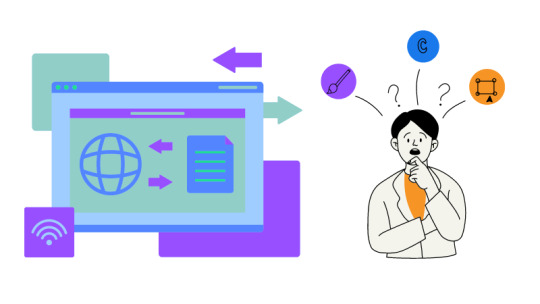
In today's dynamic business landscape, software development plays a pivotal role in driving innovation and achieving competitive advantage. However, building a robust and feature-rich software solution internally can be resource-intensive and time-consuming. This is where software outsourcing emerges as a strategic option. Partnering with a skilled software development company in Dubai allows businesses to access a wider talent pool, benefit from cost advantages, and accelerate development cycles.
However, outsourcing software development comes with its own set of challenges. Effective communication, project management, and ensuring quality deliverables are all crucial aspects for a successful outsourcing experience.
Top Challenges in Software Outsourcing
Communication Gaps: Geographical distances, language barriers, and cultural differences can significantly hinder communication. This can lead to misunderstandings, delays, and project deviations.
Scope Creep: Unclear project scope at the outset can lead to feature creep, where additional functionalities are added mid-project, impacting timelines and budgets.
Quality Control: Maintaining consistent quality standards across geographically dispersed teams can be challenging.
Data Security and Intellectual Property (IP): Ensuring the security of sensitive data and protecting your intellectual property rights is paramount when outsourcing software development.
Cultural Differences: Working with teams from diverse cultural backgrounds can lead to misunderstandings about work styles, expectations, and communication preferences.
Time Zone Disparity: Collaborating across time zones can create challenges in scheduling meetings, ensuring real-time communication, and maintaining consistent workflow.
As we navigate 2024, here are the top strategies to tackle these challenges and maximize the benefits of outsourcing your software development project:
1. Define Clear Project Scope and Requirements
The foundation of any successful project, outsourced or not, is a well-defined scope. Before embarking on your outsourcing journey, take time to clearly articulate your project goals, functionalities, and expected outcomes.
Conduct thorough user research: Understand your target audience's needs and pain points. This provides critical insights that guide the development process and ensure the final product resonates with users.
Develop detailed user stories and specifications: Break down your project into smaller, well-defined features. This detailed breakdown aids communication with the outsourcing partner and ensures everyone is on the same page.
Prioritize features and functionalities: Consider the "must-have" features and those that can be added later. This allows for flexibility and ensures core functionalities are delivered within budget and time constraints.
By establishing a clear and detailed project scope upfront, you minimize the risk of misunderstandings, scope creep, and delays throughout the development process.
2. Selecting the Right Outsourcing Partner
Choosing the right outsourcing partner is critical for project success. Here are some key factors to consider:
Technical Expertise: Evaluate the partner's experience in developing similar solutions and their expertise in relevant technologies. Look for a company with a proven track record of delivering high-quality software.
Cultural Compatibility: Consider the cultural differences between your company and the outsourcing partner. Look for a team that understands your communication style and prioritizes open and transparent collaboration.
Communication Channels and Strategies: Establish clear communication channels and define preferred methods of communication (e.g., video calls, project management tools). Ensure time zone differences are factored in for seamless communication flow.
Security and Data Protection: Data security is paramount. Verify the outsourcing partner's security protocols and ensure they comply with relevant data privacy regulations.
3. Effective Communication is Key
Clear and consistent communication is the cornerstone of a successful outsourcing partnership. Here are some strategies to foster effective communication:
Regular Meetings and Progress Reports: Schedule regular meetings to discuss project progress, address challenges, and ensure alignment on project goals. Utilize project management tools to track progress and maintain transparency.
Active Listening: Actively listen to your outsourcing partner's concerns and feedback. This fosters a collaborative environment and allows for proactive problem-solving.
Documentation is Key: Maintain clear and concise documentation, including project requirements, design decisions, and code comments. This facilitates knowledge transfer and ensures smooth development continuity.
By prioritizing open communication throughout the project lifecycle, you can build trust and collaboration, ultimately leading to a more successful outcome.
4. Robust Project Management Practices
Effective project management is vital for keeping your outsourced project on track. Here are some key practices to adopt:
Agile Development Methodologies: Consider adopting agile methodologies like Scrum or Kanban. These approaches promote iterative development cycles, allowing for flexibility and faster adaptation to changing requirements.
Dedicated Project Manager: Assign a dedicated project manager to oversee the communication, workflow, and progress of the outsourced development.
Risk Management Plan: Develop a risk management plan to identify potential challenges and establish mitigation strategies. This proactive approach minimizes disruptions and ensures project success.
By implementing robust project management practices, you can maintain control over the development process, even when working with an overseas team.
5. Quality Assurance (QA) Measures
Maintaining high-quality standards is crucial. Integrate robust quality assurance (QA) measures into your outsourcing strategy:
Define clear QA procedures: Establish well-defined testing procedures that cover functionality, performance, and security aspects of the software.
Regular Testing Throughout Development: Integrate testing throughout the development lifecycle, not just at the end. This allows for early detection and resolution of bugs, minimizing rework and delays.
Third-Party Testing (Optional): Consider engaging an independent QA firm for a comprehensive evaluation of the software's functionality and performance.
By implementing a rigorous QA process, you can ensure your outsourced software meets your quality standards and delivers a positive user experience.
Conclusion
Outsourcing software development can be a strategic option for businesses to access a wider talent pool, benefit from cost advantages, and accelerate development cycles. However, effective communication, project management, and ensuring quality deliverables are crucial aspects of a successful outsourcing experience. Defining a clear project scope and requirements, conducting thorough user research, developing detailed user stories and specifications, prioritizing features and functionalities, and selecting the right outsourcing partner are key factors to consider. Effective project management practices, such as adopting agile methodologies, assigning a dedicated project manager, and developing a risk management plan, are also vital for keeping the outsourced project on track. By implementing these strategies, businesses can maintain control over the development process, even when working with an overseas team. This proactive approach minimizes disruptions and ensures project success. Code Brew Labs is one of the best software development companies in UAE, and offer development services at affordable prices
#app development#ai software development#hiring software developers#web app development#software development company dubai#it services#software development company UAE
0 notes
Text
Mobcoder Adds to the Select List of Companies Offering the Best Data Analytics Services in Dubai
In the ever-evolving landscape of Data Analytics Services in Dubai, Mobcoder emerges as a beacon of excellence, setting new standards for businesses seeking unparalleled insights and strategic advantage. As a leading player in the industry, we pride ourselves on delivering cutting-edge solutions that not only meet but exceed the expectations of our clients.
Original Source - https://www.reddit.com/user/asshhuu_/comments/18gj6l4/breaking_through_to_the_best_data_analytics/
#hire dedicated flutter app developer#Best Mobile App Development Company in Dubai#Top Web Development Services in UAE#AI Development Company in Dubai#data analytics services in Dubai#data consulting companies in Dubai#data consulting services in Dubai
0 notes
Text
Top 10 Software Development Companies in the USA Read more:
#ai technology#technology#openai#nlp#ai generated#machine learning#ai chatbot#chatbots#chatbot#conversational ai#tech#software#software engineering#crm software#erp software uae#development#apps#school management software#information technology#services#automation#Technology#Future Technology
0 notes
Text
Let's talk about Sudan-
TRANSCRIPT UNDER CUT

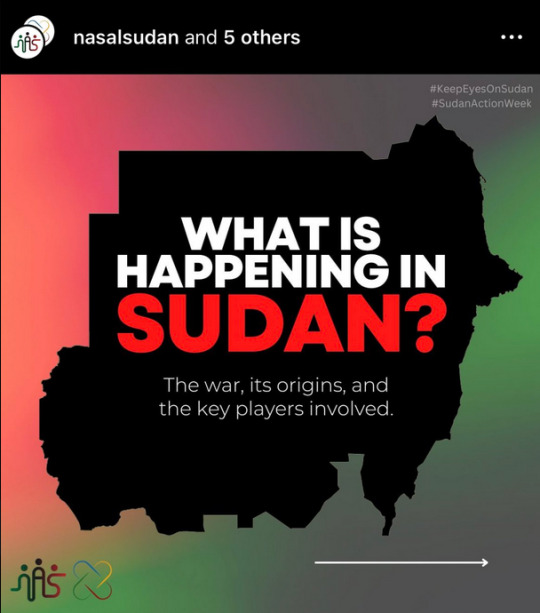
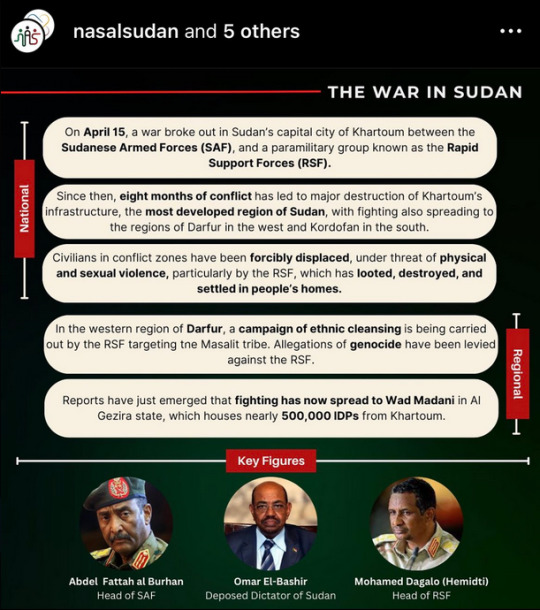
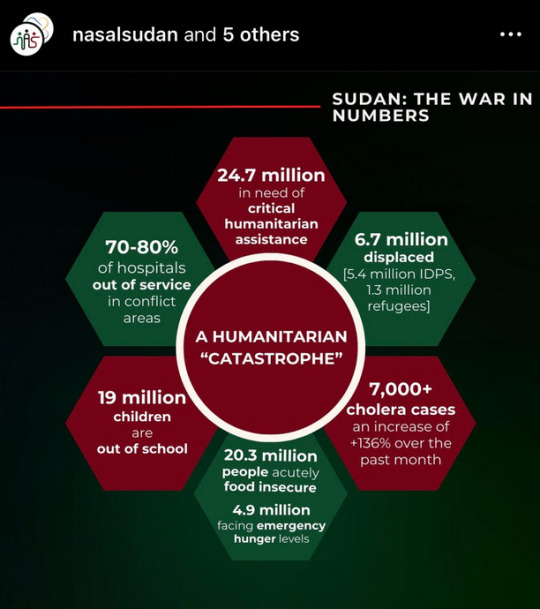

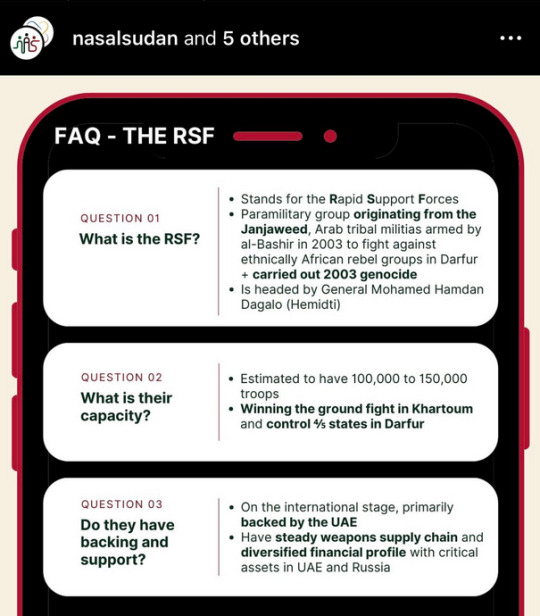
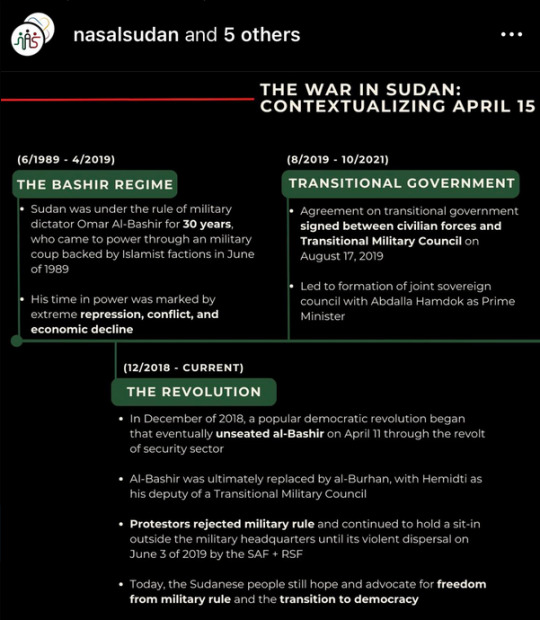
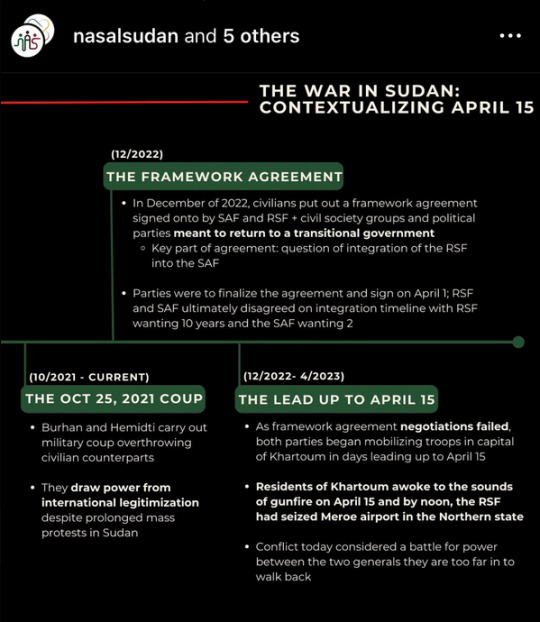
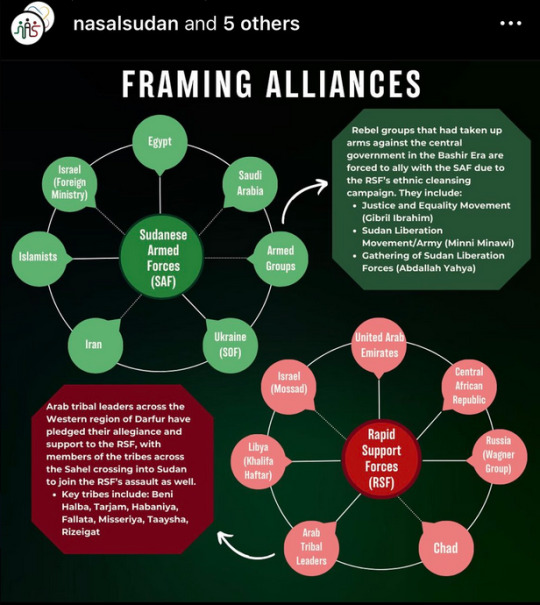
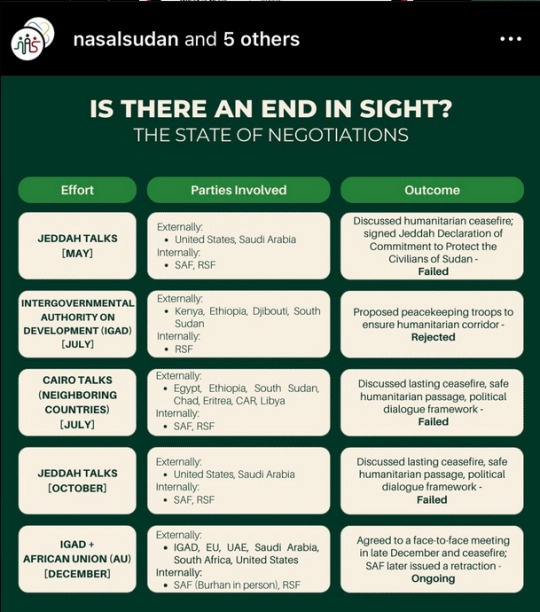

Transcript: What is happening in Sudan? The war, its origins, and the key players involved.
The war in Sudan
On April 15, a war broke out in Sudan's capital city of Khartoum between the Sudanese Armed Forces (SAF), and a paramilitary group known as the Rapid Support Forces (RSF). Since then, eight months of conflict has led to major destruction of Khartoum's infrastructure, the most developed region of Sudan, with fighting also spreading to the regions of Darfur in the west and Kordofan in the south.
Civilians in conflict zones have been forcibly displaced, under threat of physical and sexual violence, particulary by the RSF, which has looted, destroyed, and settled in people's homes.
In the western region of Darfur, a campaign of ethnic cleansing is being carried out by the RSF targeting the Masalit tribe. Allegations of genocide have been levied against the RSF.
Reports have just emerged that fighting has now spread to Wad Madani in AI Gazira state, which houses nearly 500,00 IDPs from Khartoum.
Key Figures: Abdel Fattah al Burhan (head of SAF), Omar El-Bashir (deposed dictator of Sudan), Mohamed Dagalo (Hemidti) (head of RSF)
Sudan: the war in numbers
24.7 million in need of critical humanitarian assistance 6.7 million displaced [5.4 million IDPS, 1.3 million refugees] 7,000+ cholera cases an increase of +136% over the past month 20.3 million people acutely food insecure- 4.9 million facing emergency hunger levels 19 million children are out of school 70-80% of hospitals out of service in conflict areas
FAQ - THE SAF
What is the SAF?
stands fro the Sudanese Armed Forces
is the de-facto government of Sudan
is headed by Lt. General Abdel Fattah al-Burhan
What is their capacity?
estimated to have aprox. 200,000 personnel and tactical advantage of airforce
currently control of relative northern and eastern regions of Sudan with functioning capital in Port Sudan (East)
Do they have backing and support?
on the international stage, primarily backed by Egypt
limited weapons supply from allies
internally, the SAF is ultimately considered the lesser of two evils
FAQ - THE RSF
What is the RSF?
stands fro Rapid Support Forces
paramilitary group originating from the Janjaweed, Arab tribal militias armed by al-Bashir in 2003 to fight against ethnically African rebel groups in Darfur + carried out 2003 genocide
is headed by General Mohamed Hamdan Dagalo (Hemidti)
What is their capacity?
estimated to have 100,000 to 150,000 troops
winning the ground fight in Khartoum and control 4/5 states in Darfur
Do they have backing and support?
on the international stage, primarily backed by the UAE
have steady weapons supply chain and diversified financial profile with critical assets in UAE and Russia
The war in Sudan: contextualizing April 15
6/1989 - 4/2019 - The Bashir Regime Sudan was under the rule of military dictator Omar Al-Bashir for 30 years, who came to power through an military coup backed by Islamist factions in June of 1989 His time in power was marked by extreme repression, conflict, and economic decline
12/2018 - current - The revolution In December of 2018, a popular democratic revolution began taht eventually unseated al-Bashir on April 11 through the revolt of security sector Al-Bashir was ultimately replaced by al-Burhan, with Hemidti as his deputy of a Transitional Military Council Protestors rejected military rule and continued to hold a sit-in outside the military headquarters until its violent dispersal on June 3 of 2019 by the SAF + RSF Today, the Sudanese people still hope and advocate for freedom from the military rule and the transition to democracy
8/2019 - 10/2021 - Transitional Government Agreement on transitional government signed between civilian forces and Transitional Military Council on August 17, 2019 Led to formation to joint sovereign council with Abdalla Hamdok as Prime Minister
10/2021 - Current - The Oct 25, 2021 Coup Burhan and Hemidti carry out military coup overthrowing civilian counterparts They draw power from international legitimization despite prolonged mass protests in Sudan
12/2022- The Framework Agreement In December of 2022, civilians put out a framework agreement signed onto by SAF and RSF + civil society groups and political parties meant to return to a transitional government - key part of agreement: question of integration of the RSF into the SAF Parties were to finalize the agreement and sign on April 1; RSF and SAF ultimately disagreed on the integration timeline with RSF wanting 10 years and the SAF wanting 2
12/2022-4/2023 - The Lead up to April 15 As framework agreement negotiations failed, both parties began mobilizing troops in capital of Khartoum in days leading up to April 15 Residents of Khartoum awoke to the sounds of gunfire on April 15 and by noon, the RSF had seized Meroe airport in the Northern state Conflict today considered a battle of power between the two generals they are too far in to walk back
Framing alliances
Sudnese Armed Forces (SAF):
Saudi Arabia
armed groups- rebel groups that had taken up arms against the central government in the Bashir Era are forced to ally with the SAF due to the RSF's ethnic cleansing campaign. They include: Justice and Equality Movement (Gibril Ibrahim), Sudan Liberation Movement/Army (Minni Minawi), Gathering of Sudan Liberation Forces (Abdallah Yahya)
Ukraine (SOF)
Iran
Islamists
Israel (Foreign Ministry)
Egypt
Rapid Support Forces (RSF):
United Arab Emirates
Central African Republic
Russia (Wagner Group)
Chad
Arab Tribal Leaders- Arab tribal leaders across the Western region of Darfur have pledged their allegiance and support to the RSF, with members of the tribes across the Sahel crossing into Sudan to join the RSF's assault as well. Key tribes include: Beni Halba, Tarjam, Habaniya, Fallata, Misseriya, Taaysha, Rizeigat
Libya (Khalifa Haftar)
Israel (Mossad)
Is there an end in sight? The state of negotiations
Effort- Jeddah Talks [May] Parties Involved- Externally: United States, Saudi Arabia. Internally: SAF, RSF Outcome: discussed humanitarian ceasefire; signed Jeddah Declaration of Commitment to Protect the Civilians of Sudan- FAILED
Effort- Intergovernmental authority on development (IGAD) [July] Parties Involved- Externally: Kenya, Ethiopia, Djibouti, South Sudan . Internally: RSF Outcome: proposed peacekeeping troops to ensure humanitarian corridor-REJECTED
Effort- Cairo talks (neighboring countries) [July] Parties Involved- Externally: Egypt, Ethiopia, South Sudan, Chad, Eritrea, CAR, Libya. Internally: SAF, RSF Outcome: discussed lasting ceasefire, safe humanitarian passage, political dialogue framework-FAILED
Effort- Jeddah talks [October] Parties Involved- Externally: United States, Saudi Arabia . Internally: SAF, RSF Outcome: discussed lasting ceasefire, safe humanitarian passage, political dialogue framework-FAILED
Effort- IGAD + African Union (AU) [December] Parties Involved- Externally: IGAD, EU, UAE, Saudi Arabia, South Africa, United States. Internally: SAF (Burhan in person), RSF Outcome: agreed to face-to-face meeting in late December and ceasefire; SAF later issued a retraction-ONGOING
What can you do?
The conflict in Sudan calls for the collective support of all to raise awareness about war and aid the Sudanese people on the ground, especially when we live in nations that have been complicit in the oppression of the Sudanese people. Explore the potions below and share with others. Educate yourself- deepen your knowledge about Sudan, empowering yourself with insights into the complexities of the situation. Donate- extend a helping hand to Sudan by generously donation to individuals or grassroots organizations on the ground.
Contact your reps- amplify your impact by contacting your representatives, avocating for positive change
226 notes
·
View notes
Text

سمو الشيخ حمدان بن محمد بن راشد آل مكتوم، ولي عهد دبي نائب رئيس مجلس الوزراء وزير الدفاع رئيس المجلس التنفيذي لإمارة دبي 🔻
شهدت خلال "أسبوع دبي للذكاء الاصطناعي" إعلان شركة "دو" عن إطلاق مشروع لتشييد مركز بيانات ضخم فائق الأداء بتكلفة تقدر بنحو 2 مليار درهم إماراتي بالتعاون مع شركة مايكروسوفت العالمية... استثمار جديد في البنية التحتية الرقمية لتكون الإمارات الأفضل دائماً في تبني ودعم أحدث التقنيات والابتكارات والخدمات الرقمية.
وشهدت اليوم إعلان جامعة برمنغهام دبي عن إطلاق أول برنامج دكتوراة في الذكاء الاصطناعي في دبي لإعداد كفاءات متخصصة في مختلف مجالات الذكاء الاصطناعي مثل تطوير المدن الذكية والرعاية الصحية المتقدمة والاستدامة والتنقل المستقبلي والتي تعتبر من ركائز التحول الرقمي في دبي.
كما اطلعت ضمن فعاليات "أسبوع دبي للذكاء الاصطناعي" على تقرير "حالة الذكاء الاصطناعي في دبي" الذي أصدرته هيئة دبي الرقمية بالتعاون مع ��ؤسسة دبي للمستقبل ... التقرير يستعرض الدور المحوري للذكاء الاصطناعي في إعادة تشكيل الخدمات الحكومية في دبي ومستويات تبني تطبيقاته على المستوى الحكومي.
والتقيت خلال أعمال "أسبوع دبي للذكاء الاصطناعي" أيضاً بممثلي أولى الشركات التي نالت شهادة اعتماد الذكاء الاصطناعي Dubai AI Seal ضمن مبادرة تصنيف واعتماد الشركات الموثوقة في مجال الذكاء الاصطناعي التي أطلقناها مؤخراً ... دور القطاع الخاص كان وسيبقى مهماً في تحقيق طموحاتنا للمستقبل.
_____________
His Highness Sheikh Hamdan bin Mohammed bin Rashid Al Maktoum, Crown Prince of Dubai, Deputy Prime Minister and Minister of Defence of the UAE, and Chairman of The Executive Council of Dubai 🔻
At Dubai AI Week, I witnessed an announcement from du to launch a groundbreaking AED 2 billion hyperscale data centre, in collaboration with Microsoft. This marks a significant investment in digital infrastructure, reinforcing Dubai's leadership in adopting the latest technologies, innovations, and digital services.
I also witnessed an announcement from the University of Birmingham Dubai to launch the first AI PhD programme. This programme is designed to nurture specialised talent in fields such as smart city development, advanced healthcare, sustainability, and future mobility – cornerstones of Dubai's digital transformation.
I also reviewed Dubai’s State of AI report, published by Digital Dubai in collaboration with Dubai Future Foundation. The report outlines the crucial role of AI in reshaping government services in Dubai and highlights the progress of AI adoption across various government entities.
During Dubai AI Week, I met with the first companies to receive the Dubai AI Seal, as part of Dubai’s aim to recognise and accredit trusted AI companies. The role of the private sector is, and will remain, essential in driving Dubai’s future progress and innovation.
Tuesday, 22 April 2025 الثلاثاء






10 notes
·
View notes
Text
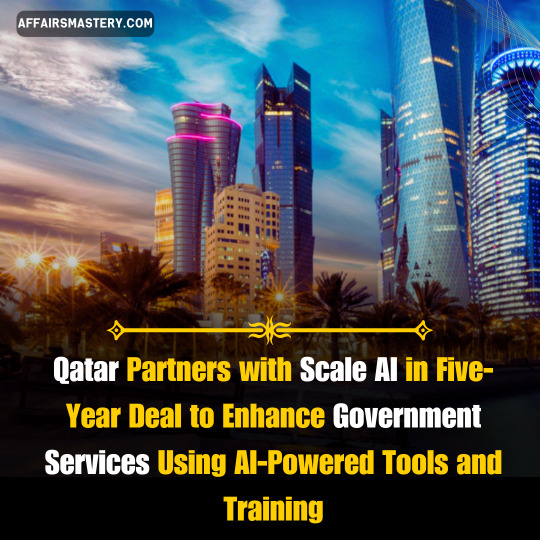
Qatar has inked a five-year deal with San Francisco-based Scale AI to integrate AI-powered tools and training, aiming to enhance government services and streamline operations. The partnership will deploy predictive analytics, automation, and advanced data analysis, with Scale AI developing over 50 AI use cases for Qatar’s government.
Trevor Thompson, Scale AI’s global head of growth, called the deal a potential "blueprint for other governments." As Qatar competes with regional rivals like Saudi Arabia and the UAE to lead in AI, this collaboration underscores its commitment to innovation. Scale AI, known for supporting tech giants like Microsoft and OpenAI, will play a pivotal role in Qatar’s AI transformation.
#general knowledge#affairsmastery#generalknowledge#current events#current news#upscaspirants#upsc#generalknowledgeindia#world news#breaking news#news#government#technology#public news#saudi arabia#uae#uaebusiness#san francisco#san fransico#ai#artificial intelligence#scale ai#ai technology#technically#tech#techinnovation#computer#governance#governo#innovation
2 notes
·
View notes
Text
AI Software Development in UAE: The Future of Intelligent Solutions

Explore how AI software development in the UAE is leading the charge in creating intelligent solutions for healthcare, finance, retail, and more. Embrace a future empowered by AI.
0 notes
Text
Understanding AI Architectures: A Guide by an AI Development Company in UAE

In a world where screens rule our day, Artificial Intelligence (AI) quietly drives most of the online tools we now take for granted. Whether it's Netflix recommending the next film, a smartphone assistant setting reminders, or stores guessing what shirt you might buy next, the trick behind the curtain is the framework-the architecture.
Knowing how that framework works matters to more than just coders and CTOs; it matters to any leader who dreams of putting AI to work. As a top AI company based in the UAE, we think it is time to untangle the idea of AI architecture, explain why it is important, and show how companies here can win by picking the right setup for their projects.
What Is AI Architecture?
AI architecture is simply the plan that lines up all the parts of an AI system and shows how they talk to one another. Think of it as the blueprint for a house; once the beams are in place, the system knows where to read data, learn trends, decide on an action, and respond to people or other software.
A solid architecture brings four quick wins:
speed: data is processed fast
growth: the platform scales when new tasks arrive
trust: sensitive details are kept safe
harmony: it plugs into tools the business already uses
Because goals, data amounts, and launch settings vary, every model-whether machine learning, deep learning, NLP or something else-needs its own twist on that blueprint.
Core Layers of AI Architecture
Whether you're putting together a chatbot, a movie recommender, or a smart analytics dashboard, most projects rest on four basic layers.
1. Data Layer Every AI starts with data, so this layer is ground zero. It handles:
Input sources, both structured tables and messy text
Storage options, from classic databases to modern data lakes
Cleaning tools that tidy and sort raw bits into useable sets
In the UAE, firms juggle Arabic, English, and several dialects across fields like finance and tourism, so keeping fast, local data clean can make-or-break a project.
2. Modelling Layer Next up, the brains of the operation live here. Data scientists and engineers use this stage to craft, teach, and test their models.
Major pieces include:
Machine-learning algorithms, such as SVMs, random forests, or gradient boosting
Deep-learning networks, like CNNs for images or Transformers for text
Training platforms, with tools from TensorFlow, Keras, or PyTorch
An AI shop in Dubai or Abu Dhabi tunes this layer to local patterns, legal rules, and industry demands-whether that's AML flags for banks, fast scans for hospitals, or fair-value estimates for buyers.
3. Serving Layer After the models finish training, they must be put into action and made available to users or business tools. This step includes:
APIs that let other software talk to the model
Places to run the model (on-site, in the cloud, or a mix)
Speed tweaks so answers come back fast
In a fast-moving market like the UAE, especially in Dubai and Abu Dhabi, a slow reply can turn customers away. That makes this layer so important.
4. Feedback and Monitoring Layer AI systems are not plug-and-play for life; they learn, drift, and need care. This layer keeps things fresh with:
Watching how the model performs
Collecting feedback from real-world results
Re-training and rolling out new versions
Without that routine check-up, models can grow stale, skewed, or just plain useless.
Popular AI Architectures in Practice:
Lets highlight a few AI setups that companies across the UAE already count on.
1. Client-Server AI Architecture Perfect for small and mid-sized firms. The model sits on a server, and the client zips data back and forth through an API.
Use Case: Retail chains analyze shopper behavior to better place stock.
2. Cloud-Native AI Architecture Built straight into big clouds such as AWS, Azure, or Google Cloud. It scales up easily and can be deployed with a few clicks.
Use Case: Fintech firms sifting through millions of records to spot fraud and score loans.
3. Edge AI Architecture Edge AI moves brainpower right onto the gadget itself instead of sending every bit of data to faraway cloud servers. This design works well when speed is vital or when sensitive info cant leave the device.
Use Case: Think of smart cameras scanning mall hallways or airport lounges in the UAE, spotting unusual behavior while keeping footage onsite.
4. Hybrid AI Architecture Hybrid AI blends edge smarts with cloud muscle, letting apps react quickly on a device but tap the cloud for heavy lifting when needed.
Use Case: A medical app that checks your heart rate and ECG in real time but uploads that data so doctors can run big-pattern analysis later.
Challenges to Consider While Designing AI Architectures
Building a solid AI backbone is not as simple as plug-and-play. Here are key hurdles firms in the UAE often encounter.
Data Privacy Regulations
With the UAE tightening digital-security rules, models must meet the Personal Data Protection Law or face fines.
Infrastructure Costs
Top-notch GPUs, fast storage, and chilled racks add up fast. A skilled UAE partner will size the setup wisely.
Localization and Multilingual Support
Arabic-English chatbots have to handle dialects and culture cues, which means fresh, on-the-ground training, not off-the-shelf data.
Talent Availability
Brilliant models need more than code; they rely on data engineers, AI researchers, DevOps pros, and industry insiders speaking the same language.
How UAE Businesses Can Profit from Custom AI Setups?
Across the UAE, artificial intelligence is spreading quickly-from online government services to real-estate apps and tourism chatbots. Picking or creating a custom AI setup delivers:
Faster decisions thanks to real-time data analysis
Better customer support through smart, automated replies
Lower costs via predictive maintenance and lean processes
Higher revenue by personalizing each users journey
Partnering with a seasoned local AI firm gives you technical skill, market know-how, rule-following advice, and lasting help as your project grows.
0 notes
Text
Hire Dedicated Android & iOS App Developers in Indore for Custom Solutions – Young Decade
Looking for experienced Android and iOS app developers in Indore? At Young Decade, we provide top-notch mobile app development services tailored to your business needs. Our dedicated developers specialize in building scalable, high-performance apps that help businesses thrive in the digital world. Whether you need a custom Android application or a feature-rich iOS app, we deliver solutions that drive success.

Why Choose Young Decade for Mobile App Development?
✔ Dedicated Android & iOS Developers – Our skilled team ensures high-quality, user-friendly, and robust mobile applications. ✔ Customized App Solutions – We develop apps that align with your business goals and market demands. ✔ Cross-Platform Expertise – We create applications that work seamlessly across multiple devices. ✔ Agile Development Approach – We follow a flexible and efficient development process to deliver projects on time. ✔ Cutting-Edge Technologies – From AI-powered features to cloud integration, we use the latest tools to enhance app functionality. ✔ Trusted by Global Clients – We proudly serve businesses in the USA, Canada, Dubai (UAE), and India with exceptional mobile app solutions.
Hire the Best Mobile App Developers in Indore Today!
At Young Decade, we understand the importance of a strong mobile presence. Our expert developers build secure, high-performing, and scalable mobile applications tailored to your industry needs.
📲 Transform your business with a powerful mobile app! Contact Young Decade today and hire the best Android & iOS developers in Indore for your project. 🚀
#software development#software development company#android app developers#best android app development company#developers & startups#app development company#Top IT companies in Indore#Flutter app development company in Indore#react native app development company in Indore
2 notes
·
View notes
Text
How Artificial Intelligence Courses in Dubai Are Preparing Students for Real-World AI Challenges?
In today’s rapidly evolving tech landscape, the demand for skilled professionals in Artificial Intelligence (AI) is skyrocketing. From predictive analytics and chatbots to autonomous vehicles and smart manufacturing, AI is transforming the way businesses and societies function. Dubai, known for its futuristic vision and innovation-driven economy, is quickly becoming a hub for AI education. The Data Science Course in Dubai is not just about theory — it’s about preparing students to face real-world AI challenges with practical skills, advanced tools, and hands-on experience.
The Rise of AI Education in Dubai
Dubai’s leadership has committed to making the city a global leader in artificial intelligence. With the launch of the UAE Artificial Intelligence Strategy 2031, there is a significant push towards integrating AI into all aspects of governance, economy, and infrastructure. This national vision has led to a surge in demand for skilled AI professionals, prompting educational institutions and training centers in Dubai to launch industry-focused AI courses.
From working professionals seeking upskilling to fresh graduates eager to enter the AI domain, an Artificial Intelligence Course in Dubai offers customized learning paths for various learner profiles.
Core Objectives of AI Courses in Dubai
The core objective of AI programs in Dubai is to bridge the gap between academic learning and industry demands. Most AI courses here are structured to:
Equip students with foundational knowledge in AI, Machine Learning (ML), and Deep Learning.
Provide hands-on training using real-world datasets and tools.
Offer exposure to emerging technologies like Natural Language Processing (NLP), Computer Vision, and Reinforcement Learning.
Enable students to build, train, and deploy AI models that solve actual business problems.
Promote innovation and entrepreneurship through capstone projects and startup incubation support.
Key Features of a Leading Artificial Intelligence Course in Dubai
What makes an Artificial Intelligence Course in Dubai stand out? Here are some of the most prominent features:
1. Project-Based Learning
Unlike traditional academic approaches, most AI courses in Dubai emphasize project-based learning. Students work on real-world case studies like:
Fraud detection using machine learning
Customer sentiment analysis using NLP
Face recognition using computer vision
Predictive maintenance for IoT devices
These projects help bridge the gap between theoretical knowledge and practical implementation.
2. Industry-Grade Tools and Platforms
Students gain proficiency in popular AI tools and libraries such as:
Programming Languages: Python, R
Libraries: TensorFlow, Keras, PyTorch, Scikit-learn
Cloud Platforms: AWS AI, Google Cloud AI, Azure Machine Learning
Big Data Tools: Apache Spark, Hadoop
This exposure makes students job-ready and comfortable working in any real-time AI environment.
3. Capstone Projects
A standout feature in many Artificial Intelligence courses in Dubai is the inclusion of capstone projects. These projects often simulate industry-specific problems such as:
Retail sales forecasting
Autonomous vehicle navigation
Healthcare diagnosis automation
Chatbot development for customer service
Capstone projects are usually mentored by industry experts, helping students gain valuable insights into real business operations.
4. Faculty with Industry Expertise
Another key differentiator of AI courses in Dubai is the involvement of faculty who are not just academics but also working professionals. Many instructors come from reputed organizations or have experience leading AI initiatives, offering students insights into real-world applications and challenges.
5. Career Support and Job Placement
Dubai’s AI training ecosystem doesn’t stop at delivering education — it supports students with resume building, interview preparation, and placement assistance. Institutes often have tie-ups with tech companies, startups, and innovation hubs to help students land roles like:
AI Engineer
Machine Learning Developer
Data Scientist
Computer Vision Specialist
NLP Engineer
Some institutions even offer job guarantee programs or internships that transition directly into full-time employment.
Real-World AI Challenges Covered in Dubai Courses
Dubai’s AI curriculum isn’t limited to textbook knowledge. Students are prepared to handle current and future AI challenges, such as:
1. Bias and Ethics in AI
Courses include modules on AI ethics, teaching students how to recognize, prevent, and correct bias in data and models. This is crucial in ensuring fairness and transparency in AI applications.
2. Handling Unstructured Data
Students learn to work with images, audio, text, and video — data types that are central to modern AI but notoriously difficult to handle. Techniques in NLP, image processing, and speech recognition are commonly taught.
3. Model Deployment and Scalability
Building a model is just one part of the AI lifecycle. Dubai’s courses focus on teaching students how to deploy AI models in real-world production environments using tools like Docker, Flask, Kubernetes, and cloud APIs.
4. AI in IoT and Smart Cities
Given Dubai’s push toward smart infrastructure, many courses integrate AI applications in IoT, transportation, and urban planning. Students explore how AI can power smart homes, intelligent traffic systems, and energy-efficient buildings.
5. Adversarial Attacks and Model Security
AI security is a growing concern. Some advanced courses introduce students to adversarial attacks and how to protect AI systems from tampering and misuse.
Specializations Offered by AI Courses in Dubai
Many AI programs allow students to specialize in sub-domains such as:
Computer Vision: Image classification, object detection, facial recognition
Natural Language Processing: Text analytics, machine translation, speech recognition
Robotic Process Automation (RPA): Automating business processes using AI
Reinforcement Learning: Training models that learn through trial and error (e.g., robotics and gaming)
These specializations allow students to align their education with specific career paths or industry interests.
Who Should Enroll in an Artificial Intelligence Course in Dubai?
An Artificial Intelligence Course in Dubai is ideal for:
Fresh Graduates: Looking to build a future-proof tech career
IT Professionals: Seeking upskilling in AI/ML technologies
Data Analysts: Transitioning to AI and deep learning roles
Business Leaders and Managers: Exploring AI for business transformation
Entrepreneurs and Innovators: Developing AI-driven startups or solutions
Many institutes offer flexible formats including weekend classes, online/hybrid models, and fast-track programs to cater to working professionals.
Final Thoughts
Dubai is positioning itself as a global leader in technology, innovation, and AI. Enrolling in an Artificial Intelligence Course in Dubai offers more than just academic knowledge — it’s a gateway to practical skills, real-world problem-solving, and cutting-edge tools that prepare students for the challenges of the modern AI-driven world.
Whether you're a recent graduate, a tech professional, or an entrepreneur, AI courses in Dubai are designed to equip you with the technical expertise and strategic mindset needed to thrive in this transformative field. With strong industry connections, hands-on training, and specialization options, these programs are empowering the next generation of AI leaders right from the heart of the UAE.
#Best Data Science Courses in Dubai#Artificial Intelligence Course in Dubai#Data Scientist Course in Dubai#Machine Learning Course in Dubai
0 notes
Text
Top Cyber Security Companies in UAE: Securing the Nation’s Digital Future
In today's hyper-connected world, cybersecurity is no longer a luxury — it's a necessity. With rapid digitization sweeping across the UAE in sectors like finance, healthcare, real estate, and government services, the region has become a prime target for cybercriminals. As a result, the demand for reliable and skilled cybersecurity partners has never been higher.
Whether you're a startup in Dubai or a multinational corporation in Abu Dhabi, choosing the right cybersecurity company can mean the difference between staying safe or falling victim to a costly breach.
So, how do you choose the top cyber security companies in UAE? And what sets them apart in an ever-competitive digital security market? Let’s explore this in detail.
Why UAE is a Cybersecurity Hotspot
The UAE has emerged as a regional leader in digital transformation. From smart cities like Dubai to AI-driven governance in Abu Dhabi, technology is at the heart of its development plans. However, this progress comes with an increased risk of cyber threats — phishing, ransomware, data leaks, and insider attacks have become daily occurrences.
Key reasons why cybersecurity is crucial in the UAE:
High rate of internet and mobile usage
Critical infrastructure dependence on digital systems
Booming fintech, healthcare, and e-commerce sectors
Frequent targets of politically and financially motivated cyberattacks
To combat these threats, many businesses in the UAE are turning to elite cybersecurity companies for robust, proactive, and tailored security solutions.
What Makes a Cybersecurity Company “Top Tier”?
Not every IT firm that installs antivirus software qualifies as a cybersecurity company. When we talk about top cyber security companies in the UAE, we’re referring to firms that offer:
24/7 Security Operations Center (SOC) support
Compliance expertise (e.g., ISO 27001, PCI DSS, NESA, GDPR)
Penetration Testing and Vulnerability Assessments
Managed Detection and Response (MDR)
Risk assessments and cybersecurity audits
Incident response and digital forensics
In short, they don’t just plug holes — they build secure digital fortresses around your assets.
Top Cyber Security Companies in UAE (In No Particular Order)
Here’s a curated list of some of the most trusted and well-established cybersecurity companies making waves in the UAE:
1. eShield IT Services
About: eShield IT Services has quickly gained a reputation as one of the most dependable cybersecurity firms in the UAE. What sets eShield apart is its human-centric approach combined with technical excellence. They understand that cybersecurity isn’t just about technology — it’s also about people and processes.
Core Services:
Application and Network Penetration Testing
Managed SOC services
PCI DSS & ISO 27001 Compliance Consulting
Cybersecurity Awareness Training
Web Application Security Auditing
Why Choose Them: eShield is known for offering tailored cybersecurity services for SMEs and large enterprises alike. Their team of certified experts works closely with clients to build long-term digital resilience.
2. DarkMatter (Now Part of Digital14)
About: Founded in the UAE, DarkMatter (now under the brand Digital14) is backed by the Abu Dhabi government. The company has made a name for itself by providing advanced cybersecurity and secure communications solutions, especially for government and defense clients.
Core Services:
National cybersecurity strategy consulting
Threat intelligence
Managed security services
Digital identity and secure communication platforms
Why Choose Them: Digital14 plays a crucial role in safeguarding national infrastructure and is trusted by top-tier government bodies.
3. Help AG (Part of Etisalat)
About: Help AG is a veteran player in the GCC cybersecurity market. Now part of the Etisalat Digital portfolio, Help AG offers end-to-end cybersecurity services with a strong focus on innovation and managed security.
Core Services:
Security consulting and strategy
Managed Security Services (MSS)
Threat detection and response
Cloud security
Why Choose Them: Their deep integration with Etisalat allows for better visibility, scalability, and network-level threat intelligence.
4. Paladion (An Atos Company)
About: Paladion specializes in AI-driven cybersecurity. Their AI-ML-powered Managed Detection and Response (MDR) platform helps clients proactively identify and mitigate threats.
Core Services:
MDR services
Threat hunting
Vulnerability management
Security compliance management
Why Choose Them: For businesses looking to combine AI with cybersecurity, Paladion offers an advanced, future-ready approach.
5. Trustwave
About: Trustwave is a globally recognized cybersecurity company that has a strong presence in the UAE. It’s known for compliance-driven security, making it a go-to for banks, retailers, and other data-sensitive businesses.
Core Services:
Penetration Testing
Threat intelligence
Compliance services (PCI DSS, ISO)
Incident response and breach detection
Why Choose Them: If you operate in a regulated industry, Trustwave brings the experience and tools needed to stay compliant and secure.
How to Choose the Right Cybersecurity Company in the UAE
Choosing among the top cyber security companies in UAE requires careful consideration. Here are a few tips to help you find the right fit:
1. Define Your Needs
Do you need compliance assistance, round-the-clock monitoring, or help with securing a new application? Understanding your goals will help narrow your choices.
2. Check Credentials
Look for companies with relevant certifications — ISO 27001, CREST, OSCP, CEH, and other internationally recognized accreditations.
3. Look for Industry-Specific Expertise
A cybersecurity company familiar with your industry can better understand your risks and compliance requirements.
4. Ask for Case Studies
Top companies are happy to share anonymized case studies or testimonials. This proves they have real-world experience solving similar challenges.
5. Ensure Local Presence
While remote services are possible, having a local presence in the UAE often ensures faster response times and better regulatory compliance.
Why Partnering with a UAE-Based Cybersecurity Firm Matters
Cyber threats are evolving. Today’s malware is smarter, hackers are more coordinated, and the stakes are higher. That’s why local context matters. UAE-based firms understand the region’s cyber threat landscape, legal requirements, and cultural sensitivities better than anyone else.
Moreover, the UAE government actively promotes cybersecurity through initiatives like:
UAE National Cybersecurity Strategy
Dubai Cyber Security Strategy
Abu Dhabi Digital Authority (ADDA)
Telecommunications and Digital Government Regulatory Authority (TDRA)
A local cybersecurity partner is often better aligned with these national initiatives and can help ensure compliance.
Final Thoughts
Cybersecurity isn’t just an IT problem — it’s a business risk, a legal concern, and a reputation issue. In a digitally ambitious nation like the UAE, it’s crucial to stay a step ahead of cybercriminals.
That’s where the top cyber security companies in UAE come into play. From proactive threat detection to regulatory compliance, these firms help organizations protect what matters most — their data, their operations, and their reputation.
Choosing the right cybersecurity partner might be one of the most important business decisions you make. So take the time, ask the tough questions, and partner with a team that sees your security not as a service — but as a mission.
Need a cybersecurity audit or compliance consultation in the UAE? Reach out to a trusted firm like eShield IT Services and take the first step toward total digital peace of mind.
To know more click here :- https://eshielditservices.com
0 notes